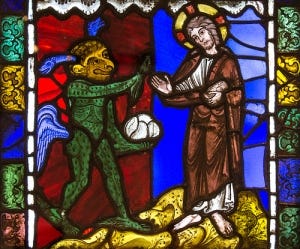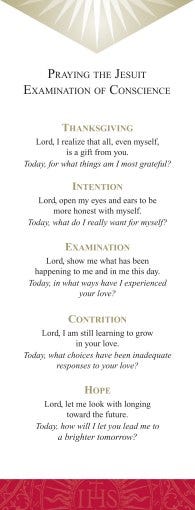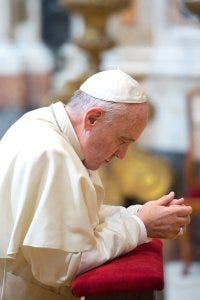The Temptations of Pope Francis
The 2014 meeting of the Synod of Bishops ended this past weekend. Many have commented on the interim relatio that came out last week and on the final report that came out this weekend, including vote totals on the individual paragraphs.
I’d like to now to direct attention to Pope Francis’ final speech in closing the Synod. I read it Sunday morning before going to teach a class on Gaudium et Spes to candidates for the permanent diaconate, and I was deeply moved as I read it (such that I incorporated sections of it into my lesson plan for the day).
In this closing speech, Francis very beautifully summarizes so much of what was being discussed at the Synod and the many difficulties that we as a Church face. This is nowhere more apparent than in 7th-11th paragraphs, where he highlights the many temptations that the Synod faces. While Francis notes that he experienced many consolations in the open discussions that occurred, there are also the desolations that we face in being tempted to easy answers. The most rhetorically and theologically beautiful of these was:
The temptation to transform stones into bread to break the long, heavy, and painful fast (cf. Lk 4:1-4); and also to transform the bread into a stone and cast it against the sinners, the weak, and the sick (cf Jn 8:7), that is, to transform it into unbearable burdens (Lk 11:46).
Anyone reading these pieces on consolation and desolation will pick up the Ignatian spiritual language Francis is using. This discernment of spirits helps us to see how we are moving towards or away from God. In the Jesuit tradition, essential to this process of discernment is the examination of conscience (or the examen), which Pope Francis has invoked in several of his homilies, including one he gave while the Synod was going on. In fact, I think the best way for us to read Francis’ closing speech is as an examination of conscience itself.
The examen has five stages. First, we express gratitude to God for the gifts in our lives, and particularly those gifts that we have experienced during the period of examination (typically at the end of the day; in this case, I think Francis is examining the entirety of the Synod). Second, we consider our intentions and ask God to help us more fully and more honestly know ourselves. Third, we review our day (or week or life) to see events where we felt closer to God or farther from God. We see especially where we fell short (and seek forgiveness), but we also see where we lived well (and praise God). Fourth, we offer these experiences to God in prayer, in hope that God will help us to know ourselves more fully. As Michael Harter, SJ says, we “let God surprise [us] with insight and console [us] with faith and hope.” Finally, we look ahead to how this examination will shape our future, with hope that this process will help lead us more fully into communion with God. With this in mind, I turn now to Francis’ speech itself.
Thanksgiving
Francis spends his first few paragraphs expressing gratitude. He first of all thanks God, “who has accompanied and guided us in the past days, with the light of the Holy Spirit.” He then goes on to thank the Synod participants, some by name and others by their general group.
Intention
The intention portion of his speech is brief (and is recalled a few times later). Initially, Francis mainly states that “we have truly lived the experience of ‘Synod,’…a ‘journey together.’” Indeed Francis’ intentions for the Synod were for them to follow what (now blessed) Pope Paul VI had intended them to be – frank, open discussions of significant issues facing the church.
Examination
This is, I think, is the heart of Francis’ message. He notes moments of “profound consolation,” listening both to “true pastors” and to those who spoke of “the beauty and the joy of their married life.” He also highlights the many moments of desolation, particularly the temptations, that the Synod experienced. Most of the temptations he notes are paired: zealous scrupulosity vs. false mercy, stones into bread vs. bread into stones; neglect of the deposit of faith vs. neglect of the lived reality on the ground. While his section on temptations is politically savvy (it shows that he understands the various divisions within the Synod and the Church on these issues), it is also a theologically compelling reading of the challenges of living faithful lives in the modern world. James Keenan, SJ, describes mercy as “the willingness to enter into the chaos of others so as to answer them in their need,” and that really does mean engaging with chaos. What we do in that chaos can be hard to see and know, and I think it frustrates easy answers. Francis here is seeking a middle course, not in the simplistic language of political moderation, but in the more fundamental language of the virtuous, golden mean. How do we live lives oriented to the good in the midst of the many profound and challenging realities of messy, everyday, entirely human lives?
Offering in Prayer
Here, Francis looks again and what the church is and what it is commissioned to do. The bishops are called “not as masters but as servants” with “the duty of guarding…and serving [the Church].” This means upholding the deposit of faith and recognizing and affirming the reality of daily life. We as the church offer up our experiences on “rough and choppy” seas, hoping that the Holy Spirit truly guides us. And we ought to be open to surprising and new insights from God. One that sticks out in this speech is when Francis says that not only ought we to “nourish the flock,” but we should “seek to welcome” the lost sheep. This phrasing might strike many who noted the translation shift in the interim relatio (which initially said “welcome” and then said “provide for” with reference to gay and lesbian Catholics). Francis goes on to say “I made a mistake here. I said welcome: [rather] to go out and find them.” It’s not sufficient to wait with open arms for the lost sheep; we must, like the good shepherd of the parable, go out and search for and bring in those who are separated.
Hope
In the final three paragraphs, Pope Francis turns to the future. Recognizing that this meeting of the Synod is one part of a larger year-long process, as well as part of a longer process in the life of the Church, Francis reminds the Synod participants and all the faithful that “we still have one year to mature, with true spiritual discernment, the proposed ideas and to find concrete solutions.” We have on year, in which we hope “the Lord [will] accompany us, and guide us in this journey for the glory of His Name.” Francis’ examen of the Synod closes by looking to what we are called to do now with the collected reflections on issues facing the family.
In the end, Francis’ speech represents his own examination of conscience of the Synod. He expresses gratitude, looks at where the Holy Spirit is working, where there is consolation and desolation, and ultimately looks to the future for where we hope God will guide us. In so doing, he models one way that the Ignatian tradition of spirituality can positively guide our discernment of our mission as Church.






